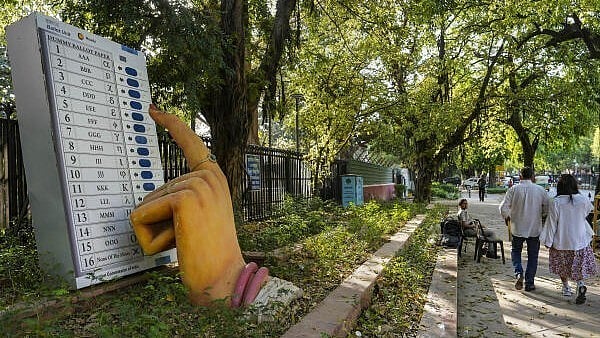
Model of Electronic Voting Machine (EVM) outside Election Commission of India office.
Credit: PTI File Photo
New Delhi: The Supreme Court on Thursday asked the Election Commission to consider Aadhaar cards, voters ID card and ration cards in its special intensive revision of electoral rolls, being undertaken in Bihar ahead of Assembly polls in November.
A bench of Justices Sudhanshu Dhulia and Joymalya Bagchi also told the EC to give reasons for not considering Aadhaar, EPIC and ration cards, after noting that the poll panel has already made list of 11 documents to consider for putting the name of residents in voters list but those were not exhaustive.
Acting on a batch of petitions filed by NGO Association for Democratic Reforms and others, the court issued notice to the EC and fixed the matter for consideration on July 28.
Having heard senior advocates Kapil Sibal, A M Singhvi, Gopal Sankaranarayanan and others, the bench noted the petitioners were not pressing for any interim relief.
Allowing the EC's continue with the special intensive revision of electoral rolls, the court decided to examine the power and manner of conducting the exercise and the timeline too, as the polls are due in November in Bihar.
The EC led by senior advocate Rakesh Dwivedi contended Aadhaar cannot be considered as a proof of citizenship or domicile as per the Act.
The court, however, pointed out Aadhaar has been the basis of obtaining other documents including caste certificate which has been notified as a document, for being in the electoral roll.
"We feel since Aadhaar has been taken as a solid proof for inclusion in electoral rolls, it should be included. Your inclusion list is all about identity, matriculation certificate etc," the bench told the EC's counsel.
The court also pointed out Aadhaar Act cannot be read disregarding other laws.
During the hearing, the petitioners' counsel contended disenfranchising even one eligible voter would hit level playing field, democracy and the basic structure.
The court also asked the petitioners if it is not the mandate of the EC that a person who is not qualified should not vote and the person who is qualified should be in the list.
"They are doing what is provided in the Constitution right, So you can't say that they are doing what they are not supposed to," the bench told the petitioners.
With regard to fixing year 2003, the bench said there is a practicality involved. They fixed the date because it was the first time after computerisation.
The bench also pointed out Sub Section 3 of section 21 of Representation of People Act provided that the EC can conduct a special revision of the electoral roll in such manner that it may think fit.
With regard to the timing of the exercise, the bench said, "There is nothing wrong in the EC purging electoral rolls through an intensive exercise in order to see that non citizens don't remain on the electoral role. But if you decide only a couple of months before a proposed election?"
The petitioners counsel insisted that the manner of the exercise may lead to disenfranchisement of voters.
EC's counsel submitted let the revision exercise be completed and then the court can look at the entire picture.
The bench, however, said, "Once the list is completed and notified, no court will touch it."
NGOs Association for Democratic Reforms, PUCL, TMC MP Mahua Moitra and RJD MP Manoj Kumar Jha and activist Yogendra Yadav, among others have filed separate petitions challenging the validity of the Election Commission's June 24, 2025 communication, in this regard.
Opposition parties also approached the Supreme Court challenging the ECI's electoral roll revision in Bihar.
Meanwhile, KC Venugopal of Congress, Supriya Sule of NCP, D Raja of CPI, Harinder Malik of Samajwadi Party, Arvind Sawant of Shiv Sena UBT, Sarfraz Ahmed of JMM and Dipankar Bhattacharya of CPI(ML) also filed the plea in this regard.
The petitioners claimed the move was in violation of Articles 14, 19, 21, 325 and 326 of the Constitution as well as provisions of Representation of People’s Act, 1950 and Rule 21A of the Registration of Electors Rules, 1960.
They contended the SIR order, if not set aside, can arbitrarily and without due process disenfranchise lakhs of voters from electing their representatives, thereby disrupting free and fair elections and democracy in the country, which are part of basic structure of the Constitution.
The documentation requirements of the directive, lack of due process as well as the unreasonably short timeline for the said special intensive revision of electoral roll in Bihar further make this exercise bound to result in removal of names of lakhs of genuine voters from electoral rolls leading to their disenfranchisement, they claimed.
